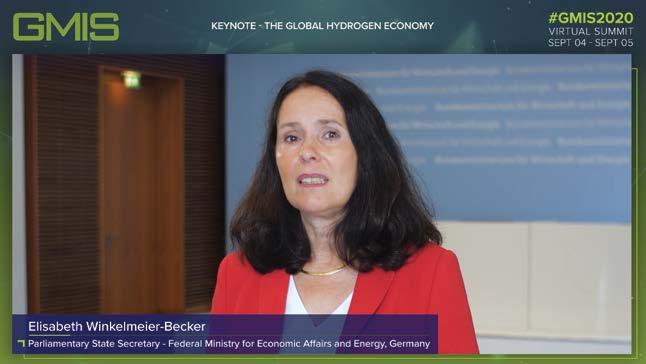
8 minute read
Panel: Pushing The Limits in the Healthcare, Telecoms and Education Sectors: Bent, but not Broken?
DAY TWO: Panel Discussion
WATCH FULL VIDEO
WATCH HIGHLIGHTS
H.E. HUSSAIN AL HAMMADI Minister of Education, UAE
EDWARD ZHOU Vice President for Global Public Affairs, Huawei Technologies

The COVID-19 pandemic has been the catalyst for a massive adoption of advanced technologies in the healthcare, education and telecommunications sectors, heard a discussion on the impact of the pandemic on the education and telecoms sectors.
Demand for telemedicine consultations rose 60-fold in the US alone, while over 1.2 million students in the UAE shifted to distance learning within two weeks.
The UAE had been well-prepared to make that shift, said H.E. Hussain Al-Hammadi, the UAE’s Minister of Education, thanks to the launch of the Mohammed Bin Rashid Smart Learning Initiative in 2012. The initiative had introduced ‘Smart Classes’, whereby students utilise smart devices and high-speed 4G networks as a means of acquiring knowledge. “We really invested a lot a long time ago in all these infrastructure requirements to enable us to continue educating in different scenarios,” he said. “It’s about building the best learning platform that is really smart, resilient, and meets modern requirements. Then you need to provide teachers and students with appropriate devices that enable them to enter the network and have the capabilities to use advanced applications and software to be embedded in the learning platform.” The rapid shift to distance learning on an unprecedented scale had still created huge technical and logistical challenges for the education system, said Al-Hammadi. To deal with this, the Ministry of Education created a Satellite Operations Centre to cope with the demand and connect with the parents and students.
Edward Zhou, Vice President for Global Public Affairs, Huawei, highlighted the role that telecommunications had played in

keeping economies moving during the pandemic, but stressed the disproportionate impact that the virus has had on communities that still have no access to the internet.
“COVID-19 has been a reminder that we are still not doing enough,” said Zhou. “The current foundation is not as strong as we might think. According to the ITU, just under half of the world’s population is still offline, and has no access to digital technologies. Children in remote areas have been unable to join online classes during the pandemic.”
Zhao said investment in infrastructure at government level is a fundamental part of the solution, which should be accompanied by progressive tax policies that incentivise corporate investment. Increased investment would help support digital transformation of businesses, which has become an urgent priority in light of the pandemic. He also said governments should define network equipment as critical infrastructure which would allow workers to operate the network and maintain equipment during a time of crisis. PUSHING THE LIMITS IN THE HEALTHCARE, TELECOMS AND EDUCATION SECTORS: BENT, BUT NOT BROKEN?

H.E. HUSSAIN AL HAMMADI
Minister of Education, UAE
EDWARD ZHOU
It’s about building the best learning platform that is really smart, resilient, and meets modern requirements. Then you need to provide teachers and students with appropriate devices that enable them to enter the network and have the capabilities to use advanced applications and software to be embedded in the learning platform
COVID-19 has been a reminder that we are still not doing enough. The current foundation is not as strong as we might think. According to the ITU, just under half of the world’s population is still offline, and has no access to digital technologies. Children in remote areas have been unable to join online classes during the pandemic
DAY TWO: Panel Discussion
DR. BERNARDO CALZADILLA-SARMIENTO Managing Director, Directorate of Digitalization, Technology and Agri-Business, UNIDO
ELENA SANTIAGO CID
Director-General, CEN and CENELEC
PROF. JOAO CARLOS FERRAZ
Associate Professor, Instituto de Economia, Universidade Federal do Rio de Janeiro

WATCH FULL VIDEO
WATCH HIGHLIGHTS
The scale of the global COVID-19 pandemic has highlighted the urgent need for standardisation in medicine, innovation and industry, heard a panel discussion on the need for digital standardisation in a post-crisis world.
From the AI innovations that will come to define tomorrow to the critical Personal Protective Equipment (PPE) that frontline medical workers are using today, there is an urgent need to adopt globally recognised standards to support consumers, businesses and suppliers along Global Value Chains. Cooperation between global organisations will be fundamental to such adoption. With standardisation creating trust and allowing for continuity along supply chains, Dr. Bernardo Calzadilla-Sarmiento, Managing Director, Directorate of Digitalization, Technology and Agri-Business, UNIDO, said the pandemic had highlighted how crucial it was to have international consistency as countries cooperated to share PPE, lab results, and a potential vaccine in the near future.

“At UNIDO, we are guiding the enterprises back to business continuity, because after the interruption, it’s not automatically the case that you can just open the door and resume activity,” said Calzadilla-Sarmiento. “The pandemic has highlighted that standards for trade and quality

infrastructure are absolutely important, from certification requirements, to laboratory services that need to have a basic quality, and mutual understanding across borders. Policies need to be absolutely clear and define clear roles and responsibilities.”
Elena Santiago Cid, Director-General, CEN and CENELEC, said the European Commission’s strategy is to create state-of-the-art standards that build trust and bring the best out of all organisations. “We believe it’s very important to understand that standards are a tool that generate trust in the market,” she said. “This desperate need to have harmonised documents and to create continuity within the supply chain, has been extremely high on the agenda from a strategic perspective. It has had a positive impact on the way we do things, in spite of the pandemic, because we were under so much pressure to deliver, that we put a lot of effort and energy into what was really a priority.”
Standardisation impacts a multitude of factors, noted João Carlos Ferraz, Associate Professor, Instituto de Economia, Universidade Federal do Rio de Janeiro. “Standards are the lingua franca of technology, and with so much data now, standards are absolutely necessary,” he said. “There is a need for rule-based, established agreements on how to move forward.” STANDARDISATION: ADAPTING DIGITAL STANDARDISATION RULES TO MATCH A POST-CRISIS WORLD

DR. BERNARDO CALZADILLA-SARMIENTO
Managing Director, Directorate of Digitalization, Technology and Agri-Business, UNIDO
ELENA SANTIAGO CID
Director-General, CEN and CENELEC
PROF. JOAO CARLOS FERRAZ Associate Professor, Instituto de Economia, Universidade Federal do Rio de Janeiro
The pandemic has highlighted that standards for trade and quality infrastructure are absolutely important, from certification requirements, to laboratory services that need to have a basic quality, and mutual understanding across borders. Policies need to be absolutely clear and define clear roles and responsibilities
This desperate need to have harmonised documents and to create continuity within the supply chain, has been extremely high on the agenda from a strategic perspective. It has had a positive impact on the way we do things, in spite of the pandemic, because we were under so much pressure to deliver, that we put a lot of effort and energy into what was really a priority
DAY TWO: Keynote Address
WATCH FULL VIDEO
WATCH HIGHLIGHTS
Elisabeth Winkelmeier-Becker

Parliamentary State Secretary at the Federal Economic Affairs and Energy, Germany
THE GLOBAL HYDROGEN ECONOMY
The COVID-19 pandemic has hit people and the economy hard. The crisis will continue to profoundly shape our world over the coming months as political leaders seek to make sure the economy will recover as fast as possible.
Democratic decision-making serves the purpose of delivering freedom and equality. Also, in these hard times, economy has to take into consideration the needs of all citizens, whether acting as employees or entrepreneurs, because they all need a solid basis for the welfare of their families and to succeed in achieving their personal goals.
We can also regard the pandemic as an opportunity, as a driving force for economic and social development. To tackle the crisis, cooperation and solidarity are needed. Policymakers and society have to draw the right conclusions from this crisis. Together and in solidarity with all EU member states, we have to draw the right lessons from the crisis and give the impetus that is needed for economic recovery.
During its presidency of the Council of the EU and beyond, Germany will advocate open markets as an essential part of the solution to the current challenges. With a view to overcoming the COVID-19 crisis, Germany believes that the EU has to oppose protectionist trends and strengthen free and rules-based trade. International cooperation, rulesbased trade, and open markets are a fundamental part of the response needed for the COVID-19 crisis.











